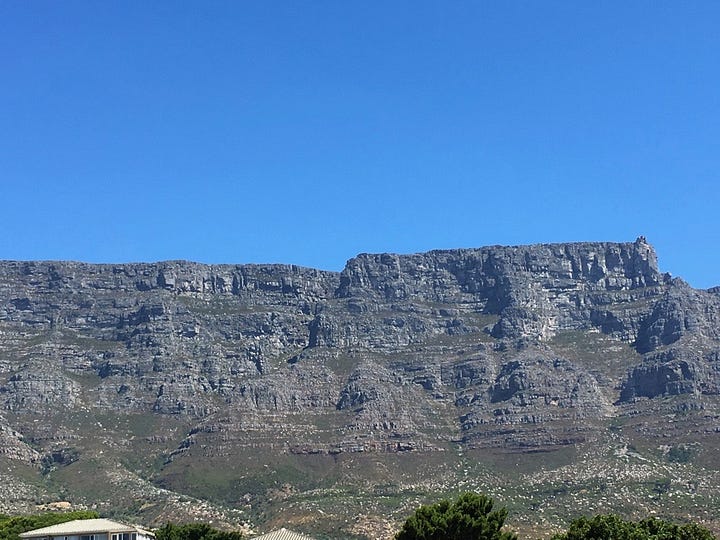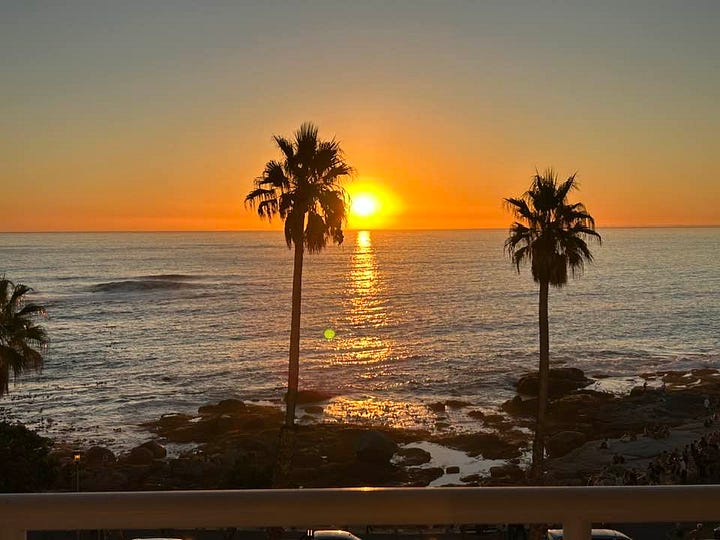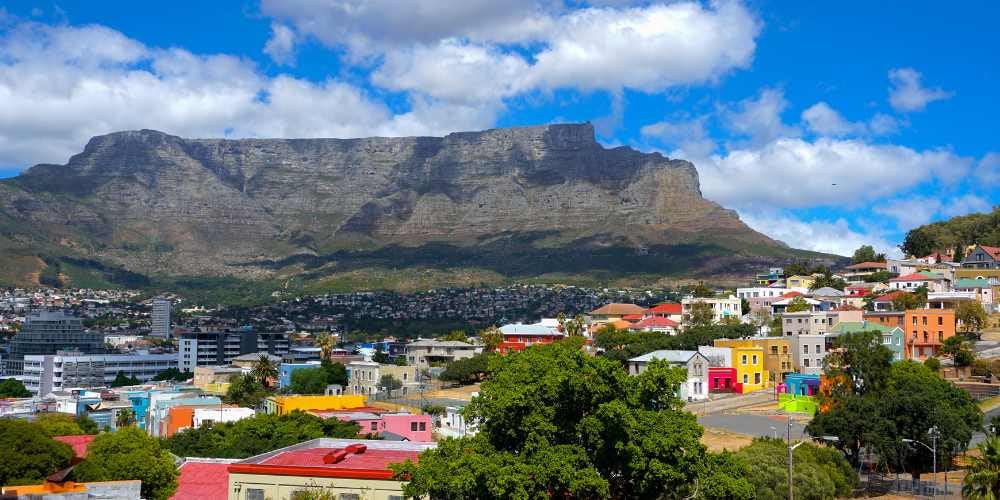Cape Town is South Africa's State of Normalcy
Going from Johannesburg to Cape Town is like entering a different country


Left: Table Mountain, the most visible and impressive natural symbol of Cape Town; right, a typical Cape Town sunset.
This is not a travel piece, but I’d be remiss in my reporting were I to neglect mentioning that this beautiful city is indeed one of the very best vacation places you could ever imagine. Cape Town’s physical beauty, a seaside city circled by huge, odd-shaped mountains, most notably Table and Lion’s Head, with magnificent beaches running from the city to dozens of picturesque small towns.
Aside from the diversity of the physical landscape, there is fascinating diversity among residents of the Cape. (I’ve touched upon this in an earlier post about South Africa.) The city has a population of 3.7 million, second only to Johannesburg. What makes Cape Town unique in this country is that it is not majority Black African, the overwhelmingly largest group in the nation. In Cape Town, the largest demographic group, at 42% are the Cape Colored (or Colored), the Afrikaans-speaking descendants of European colonists (mostly Dutch, some English) and the indigenous people they encountered when they arrived, and later, Black Africans. The Coloreds generally have Afrikaans names and are members of the same Protestant denomination as the Afrikaners. (Remember, the language gets an extra “a.”) Under apartheid, the Cape Coloreds were shunned by the Whites as being Black, and by the Blacks as being White. They remain a large and cohesive group that for the most part concentrate on their own issues. There is an exhibit in Cape Town memorializing the forced eviction of a major Colored neighborhood in the 1970’s, as the apartheid regime was beginning the into its death throes.
Black Africans constitute 37% of the local population, mostly recent arrivals from other parts of the country. When the European colonists arrived, there were none of the Black African tribal groups which today dominate the nation; those folks immigrated here centuries later; the people who lived here before the colonists arrived were the indigenous Kho (sometimes called Khoi) who were largely wiped out by the arrival of Europeans and their diseases, and later and more horribly, by genocide committed against the indigenous people by Zulu, Xhosa, and other invaders from the North. (The notion that only white-skinned people can be racists is disproven by African history; racism is a disease capable of emerging anywhere, and requires constant vigilance to suppress.)
The ANC has been encouraging Black African to move to the Cape in order to end the rule of the opposition Democratic Alliance, which has governed the Cape region and Cape Town since the end of apartheid, and that’s which a major reason why Cape Town is such a functioning city, whereas Johannesburg is on the edge of collapse. The attempts have failed, and the DA still runs the province and city.
The third largest group in Cape Town are Whites, at 16%. This is over twice the national figure of just over 7%. (Note: when I am writing about white people in the USA, I do not capitalize the word, while I do capitlize Black. That’s because while all Black Americans have strong similar life experiences, due to the history of racism, the same is not true of all white Americans. In South Africa, as a result of the apartheid era and the rise of the ANC, everyone was impacted and it shaped their identities, like it or not, so whites in the this country get a capital W, just as ever other group here gets one.) It appears to me that most White people in Cape Town are of English descent, though I come across many with Afrikaner names, and there are 15,000 Jews in the city, less than half a percent, but they have an outsized representation in just about every aspect of local business and society. I’ve been told there are many Cape Town residents of German background. There’s a small town nearby that is largely Whites of French ancestry, and there are many affluent foreigners, mostly Europeans, who have bough property here. Most Whites here speak English, and you’re most likely to hear Afrikaans spoke by the Coloreds.
1.4% of the city is Asian, though it is rapidly growing, with an influx of people from Pakistan and Bangladesh. Previously, most Asians were Indonesian and Malay people imported by the Dutch and British as laborers, and known as Cape Malay. (In many instances, their servitude wasactual slavery or tantamount to slavery.) Their traditional area of Cape Town, know as Bo Kaap, is famous for its colorful houses. Malay cuisine is a local specialty. I expect the Asian population to continue growing.

Why is Cape Town So Much Better Run than the Rest of South Africa?
The most distinctive feature of Cape Town is not actually its great diversity. What makes Cape Town unique is its ability to function as a normal city, much like any major metropolis in America or Europe. It has a fully functioning public transit system, public services seem to work well, the beaches and parks appear clean and safe, and while crime is an issue in any big city, crime in Cape Town is nowhere near the unacceptable levels of Johannesburg or Durban. There’s a busy nightlife, and the entertainment and cultural offering befit a major city. An American or European of any race, religion or color could easily live here.
The African National Congress (ANC) has never ruled this region or this city aside from a brief period from 2004-2008 when they controlled the local Cape Town government. Since the day that apartheid ended, the voters of the Cape Province and Cape Town have otherwise steadfastly rejected the ANC and have instead been governed by a multi-ethnic, pro-Western and moderate alliance known as the Democratic Alliance (DA.)
The ANC was the principal fighting force against apartheid, a coalition of the South African Communist Party, the labor unions, and the African Nationalist movement. It was and still is almost exclusively Black African, with bitter and often violent rivalries between the Zulu faction (ex President Jacob Zuma) and the Xhosa faction (President Cyril Ramaphosa). The ANC does grant some political power to Muslims who support their platform, but very, very few Whites. Jews are persona non grata in the eyes of the ANC, which regularly promulgates antisemitic screeds. President Ramaphosa recently removed a Jewish captain from the national cricket team, saying that it irritated Muslims. This is the kind of sick, racist ideology spun by the communists who run this country. (They are communists only in word; Ramaphosa, like every other ANC official, has grown fabulously wealthy through corruption and theft.)
I’m more of a political and social commentator than a travel expert, but I’d be remiss if I failed to urge any visitor to take a day trip to the wonderful wine country outside the city, and to tour the wonderful small cities and towns along the coast. Another must is a visit to Robben Island, the notorious hellhole where the apartheid government imprisoned those who fought to overthrow it; for 18 of his 27 years of imprisonment, it was the home of Nelson Mandela.
Cape Town is a world-class city in every sense of the word. It affords a glimpse of what the whole nation could be like were it rid of the crazed, corrupt and incompetent ANC. It’s also a great bargain for those who have Western currencies. The dollar goes very far here. You can live a life of luxury unattainable back home, and you see some beautiful countryside and beaches. It’s my fourth visit here, and hopefully it won’t be the last.
THE TRUTH WILL WIN IF IT IS TOLD!
Stephen Shaiken is an attorney and author. He has written extensively on Constitutional issues. He has litigated scores of Constitutional questions in federal appellate courts and is a member of the United States Supreme Court Bar.
And please check out my fiction. You can visit the Amazon Series Page for the acclaimed NJA Club Series: CLICK HERE
You can visit the Amazon page for Queensborough Rock, set amidst the NYC rock ’n’ roll world circa 1970. CLICK HERE
Check out my author’s website at: www.stephenshaiken.com
1
Share





Corrections:
1. 'most notably Tabletop and Lion’s Head'
Our mountain is called Table Mountain, not 'Tabletop'
2. "The African National Congress (ANC) has never ruled this region or this city. "
Incorrect. From 2004 - 2008 the ANC controlled local government in Cape Town.
3. " ... known as Cape Malay. (In many instances, their servitude was tantamount to slavery.)..."
It wasn't 'tantamount' to slavery - it was slavery. Slaves were traded from 1658 to 1864 when slavery was abolished. ref. https://www.sahistory.org.za/article/early-cape-slave-trade
4. Mandela spent 18 years on Robben Island, not 27. The rest of his 27 year sentence was served in prisons on the mainland.